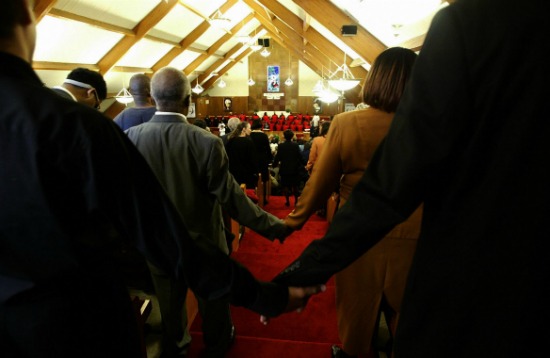It was raining, and chilly, when Hope Christian Church celebrated Pulpit Freedom Sunday this past weekend. Some 150 congregants gathered for the special 8 a.m. service, where Bishop Harry R. Jackson, Jr. stood at the lectern and announced, “Today, 1,500 pastors and counting are purposely preaching a message that violates the 501(c)(3) status of our tax code.” Tax-exempt nonprofits—houses of worship included—are forbidden from endorsing or opposing political candidates and parties. For the last five years, Alliance Defending Freedom (ADF), a Christian legal group based in Scottsdale, Arizona, has organized one Sunday a year for churches to protest these restrictions. In his sermon, Jackson joined ADF in breaking the law, saying: “I am going to tell you why I cannot support Barack Obama for president.”
The non-denominational Hope Christian Church identifies itself as a “multi-ethnic, international community.” Its 3,000 members gather throughout the week in a converted office park in Beltsville, Maryland, a predominantly African American suburb between Baltimore and D.C. Among its staff members are many black pastors, including Jackson, who has become known for his role in conservative campaigns that use social issues to try and drive a wedge between black churchgoers and the Democratic Party. While more than 95 percent of black voters supported Obama in 2008, Jackson—who worries individuals “celebrate race over grace”—hopes his flock will not do the same in 2012. “Listen to me, black Christians,” he warned. “You are foolish enough to vote against your God just because someone’s skin is black.”
Jackson’s remarks opposing Obama are in part to protest the Johnson Amendment, passed in 1954 and added to the 501(c)(3) tax code at the urging of then-Senator Lyndon B. Johnson. During a tough re-election fight in Texas, Johnson hoped to silence some of his critics, namely nonprofits that were funding his more conservative, anti-communist rival. As Patrick L. O’Daniel points out in the Boston College Law Review, Johnson was not targeting churches, but rather those organizations and individuals caught up in the rising tide of McCarthyism.
Because of the Johnson Amendment’s passage, churches now risk their tax-exempt status if they engage in pulpit politicking. “Basically what you’re doing when you endorse a candidate from the pulpit is you’re flowing thousands of dollars of non-taxed money to political parties,” said the Reverend Steven Baines of Americans United for the Separation of Church and State. “They are turning houses of worship into political action committees without risking that taxable income.” The IRS investigates nonprofits that break regulations, but there is a backlog of cases, according to Baines. Tax-exempt churches pay no taxes on donations or supplies, and their members can write off donations when they file their own taxes. On Sunday, before Hope Christian took up tithes and offerings, a pastor reminded members to fill out the appropriate form with their donation—“We want to make sure you get your tax credit.”
ADF contends the Johnson Amendment violates free speech, though the IRS allows ministers to preach on political issues, so long as they stop short of a political endorsement. “Today we violate our IRS regulations because we believe we need a free pulpit,” Jackson said. His sermon drew on history, invoking the prophet Elijah alongside abolitionists, Harriet Beecher Stowe, John Wesley, and Martin Luther King—those he saw who engaged a free pulpit and civil disobedience. He preached, “We’ve got to understand we will not be silent!” Congregants clapped, some shouted, “Amen!” Jackson never uttered Romney’s name; instead he documented what he perceived to be Obama’s shortcomings on abortion, gay marriage, Israel, and religious liberty. “Beware my Christian friends,” he said in closing, “of voting for Barack Obama.”
Not everyone in the congregation looked pleased. In the back row, a man in a tweed suit held his head in his hands and muttered under his breath, “This is ridiculous.” After the service, he introduced himself as Melvin Witten, a 53-year-old lawyer from D.C., noting, “I go to a more traditional black Baptist church.” His neighbor had invited him. “You can make any point you want to make,” he said of the sermon. “But don’t just say Obama is the wrong choice. Show why Romney is the right choice.”
Tiffany Stanley is managing editor of Religion & Politics.
